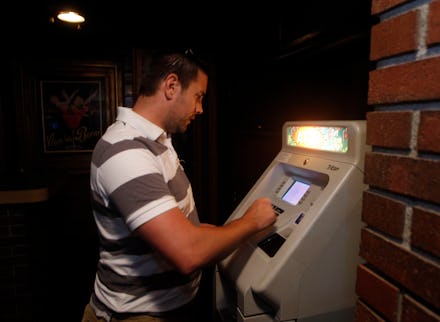Finding an ATM could get harder as thousands of small businesses avoid making upgrades

Thousands of independent ATMs — those grungy machines you see in backs of bars and corner groceries — are about to disappear thanks to payment-processing rules going into effect starting this October and rolling out over the year.
Starting Oct. 1, MasterCard is requiring that owners of ATMs in private businesses assume liability for fraud if their payments systems aren't up to date. Visa will also start holding merchants accountable, but not until next year.
That will mean upgrading machines to be compliant with the new chip cards that payment processing companies began rolling out en masse last year. MasterCard researchers estimate that chips reduce the costs of fraud by 54%.
Roughly half of the 400,000 or so ATMs in the country are operated by private businesses, which industry officials told Marketwatch are less likely than banks to maintain the latest payment technology.
Problem is, upgrading ATMs can cost up to thousands of dollars.
If the cost of making the changes outweighs what owners are making off of ATM fees, then they'll have little incentive to actually switch their machines —and some may just do away with them entirely.
Experts told Marketwatch they expect that anywhere between 10% to 15% of the total number of ATMs in the country won't be upgraded, meaning that owners will either take those machines out of commission, or just leave them up and hope that no debit fraud happens on their watch.
Now, fewer indie ATMs could be a good thing for your wallet, as it'll force you to use your bank's machines — which won't charge you a fee to take out cash. Out-of-network and third-party ATM fees have risen sharply over the last five years, climbing 21% to average more than $4.50 per withdrawal. One industry official told Today these charges can add up to $200 to $300 a year for typical consumers.
The problem, of course, is convenience: If you don't have an ATM or bank branch nearby, the decreased availability of non-bank ATMs could be a nuisance.
Perhaps not coincidentally, this morning the payment app Venmo rolled out its first major promotional effort with a series of advertising buys on MTV and Comedy Central. In addition to giving people an easy way to pay friends back for a beer, cashless payments are increasingly available from merchants like Munchery and Gametime, and Venmo has discussed plans to move into brick-and-mortar businesses, as well.
Then again, our cashless future is still somewhat distant. Venmo's parent, PayPal, plans on unrolling the new in-store features starting in 2017 at the earliest.
In the meantime, to buy drinks at your favorite cash-only bar, you'll have to take out money the old fashioned way — at the bank.
And if you're lucky (or lazy) enough to still rely on the bodega ATM on your corner, opt for a checking account that reimburses out-of-network ATM fees. Some examples include Charles Schwab's High Yield Investor checking account and Aspiration's Summit checking account. PNC, Ally, and BankFive also offer accounts that reimburse fees, but set limits of $10 to $15 per month.